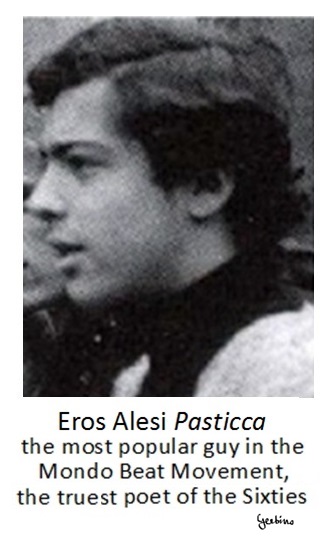
Eros Alesi Pasticca
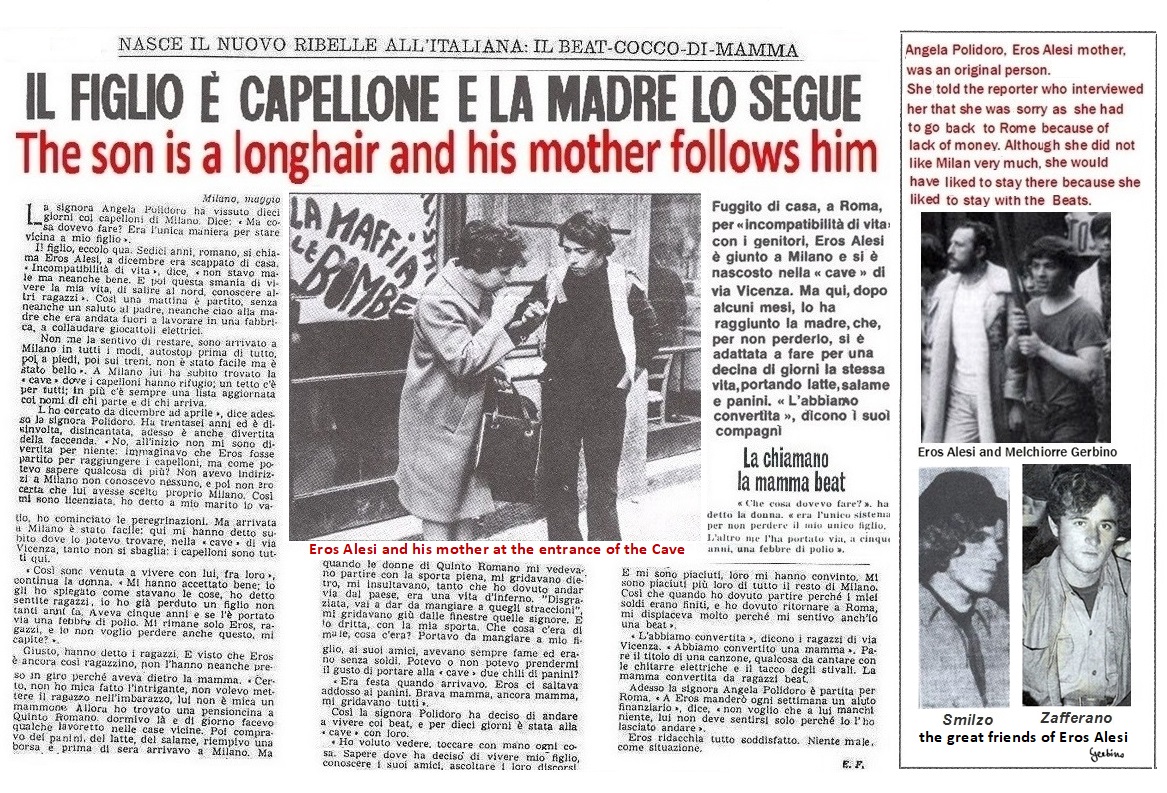
Eros Alesi Pasticca, his mother Angela Polidoro, his friends Smilzo and Zafferano.
The fifth issue of Mondo Beat magazine marked the end of Onda Verde's collaboration with Mondo Beat, as none of the guys from Onda Verde submitted articles for publication. There was no controversy, but being students in their last year of high school, busy preparing for final exams, they had not had time to participate in the events of the birth of the Contestation and had remained extraneous to the course of the Movement. As a result, the Onda Verde Group, made up of a few people and without any participation of girls, would have dissolved, while the Mondo Beat magazine would have lacked the contribution of brilliant collaborators such as Antonio Pilati and Marco Maria Sigiani.
Regarding this fifth issue of Mondo Beat magazine, the day of its publication marked a fateful date, due to the article published on the cover of it, with which Mondo Beat attacked the Corriere della Sera. It's no exaggeration to say it, as this article was the first tremor of an earthquake which ultimately would have left the Establishment media devastated.
Since in the Sixties there was a merciless intellectual confrontation between generations, the old Italian intelligentsia, which was provincial, would end in disaster, due to its inability in coping with the new intelligentsia, which was cosmopolitan. Thus, let's go back a few steps in history to explain what kind of people constituted the Italian intelligentsia up to the times of Mondo Beat and the Contestation.
At the end of the Second World War, the Sicilian mafiosi who escaped the roundup of the prefect Cesare Mori and took refuge in the United States were welcomed back into Sicily, where otherwise the Mafia had been eradicated by Fascism. The return of these mafiosi occurred due to the acquiescence of Pope Pius XII (Eugenio Pacelli) who wanted to hinder progress in Sicily.
Subsequently the Vatican, first in Sicily, then throughout southern Italy, would have selected politicians, magistrates, police commissioners and other officials to put at its service, with the ultimate goal of hindering progress in southern Italy. A substantial part of this kind of officials would have been transferred to northern Italy, to slow progress in that part of the country as well.
Why so much opposition to progress by the Vatican?
Because the Vatican will one day die of progress and the Vatican is aware of it. Therefore, the Vatican tries to push this day as far into the future as possible. If you understand this, you will understand true Vatican politics in the modern era, anytime, anywhere.
Why were so many officials, whom the Vatican needed for its policies in northern Italy, moved there from the south? Could not the Vatican have selected all the officials needed in northern Italy by selecting them from the same area?
No, it couldn't, because in northern Italy it was almost impossible to find a young lawyer who would join the police as commissioner, while in southern Italy, due to precarious economic conditions (for which the Vatican is largely responsible), hundreds of young lawyers would have accepted such a job. Furthermore, and this is of great importance to consider, a young lawyer from northern Italy, who would have served as police commissioner, would not easily have done a dirty job at the request of the Vatican, whereas a good part of the police commissioners, transferred to the north from the south, yes, they would have done it. This, because northern Italy was inhabited by individuals who were more developed than those of the South and not only economically, but also as conscience, the two conditions being corresponding. Finally, it would not have been necessary for the Vatican to continuously order the officials transferred from the South to the North to slow down progress, since they would have done it themselves, because individuals raised in underdeveloped areas need time to emancipate themselves, and therefore progress will come somehow hindered by them, certainly not accelerated.
I say all this without any racist motivation, as I am Sicilian.
But, if it is obvious that by doing so the Vatican is hindering progress, on the other hand, when unpredictable epochal changes occur, the Vatican will not be prepared to face them, because it will not have an intelligentsia at its service, but a hodgepodge of people of little value. And in this inability to face the new the Vatican would have found itself in the clash with the Contestation. In fact, a substantial part of the journalists who made up the editorial staff of Corriere della Sera, Corriere d'informazione and La Notte, the 3 newspapers which had been entrusted with the task of confronting the Contestazione, were individuals coming from the underdeveloped areas of Southern Italy. Of course, they knew how to write in flowery Italian, but their intellectual dimension was that of the provincials of Southern Italy, their existential condition was that of sexually not fully satisfied individuals. These characters could not have been thoughtful, let alone serene, facing the scenarios of a sexual revolution that Mondo Beat was opening up. Under the pretext of promoting morality, they would have waged a furious campaign against Mondo Beat, day after day without any strategy, without realizing that they were ending up in the grotesque, while many of their readers would have noticed it.
In the editorial staff of these 3 newspapers there were also journalists from northern Italy, but almost all of them were dad's children, who had obtained the position without merit. They usually tried to catch butterflies and would have continued in the midst of a devastating earthquake.
Now, going to the point, that is the explanation of why Melchiorre Gerbino frontally attacked the Corriere della Sera, the reason was that this newspaper had incessantly waged a devious campaign against the Mondo Beat Movement.
Below is a collage of titles and photos which over time were published by the Corriere della Sera in order to give a negative image of the Mondo Beat Movement. It must be said there was systematic misinformation in all the titles and corresponding articles.
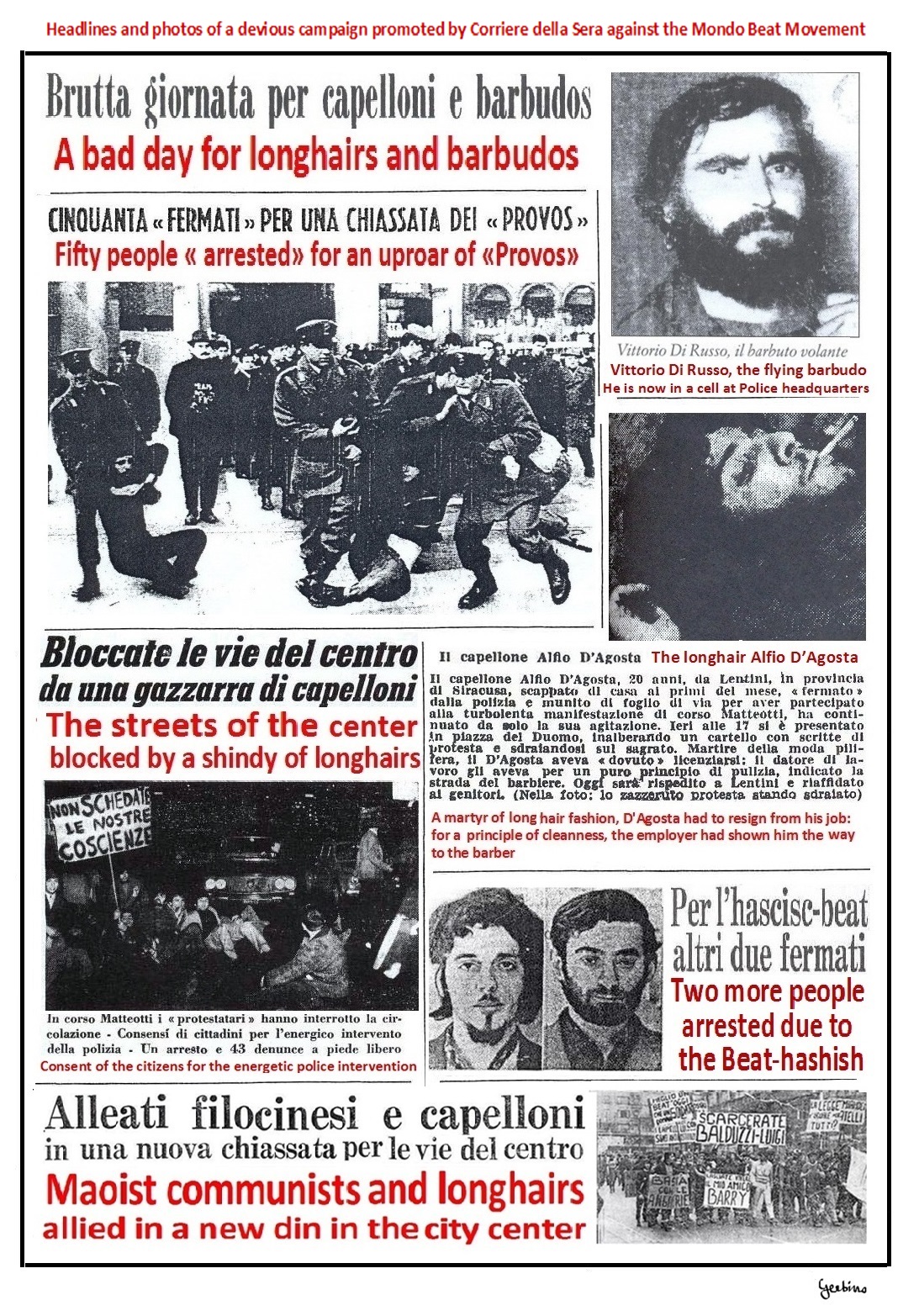
Titles and photos of the articles of the devious campaign waged by Corriere della Sera against the Mondo Beat Movement.
Before the pacification with the Milan Police Headquarters, Mondo Beat did not have the capacity to face Corriere della Sera, as all its resources were dedicated to the defense of the Movement,, which was constantly under attack. But since it no longer had to face the police and could raise the bar, Mondo Beat would have attacked the Corriere della Sera with a Contestazione-style campaign. Below, the first move of this campaign
Mondo Beat N. 3 - Front page
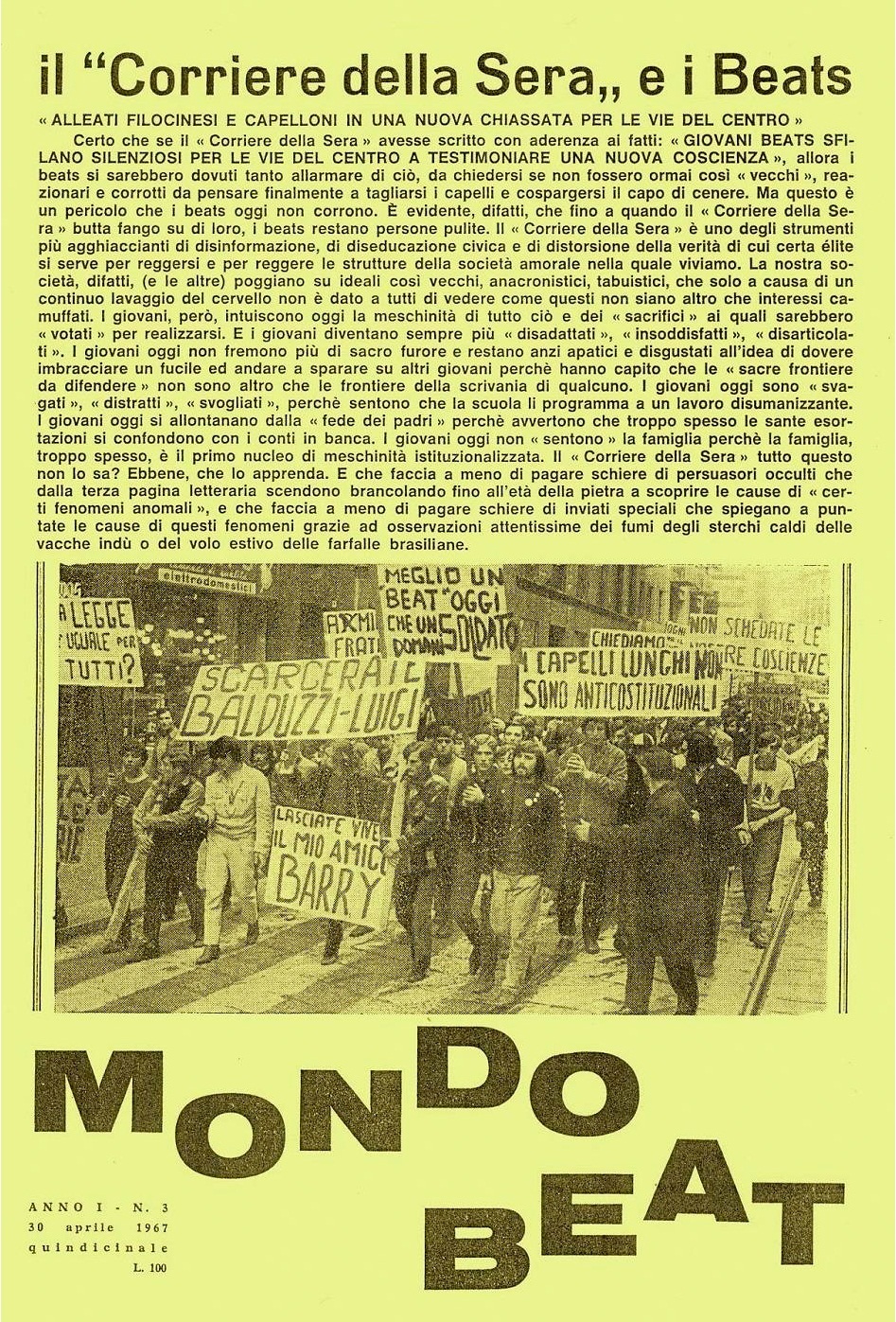
Mondo Beat N. 3, page 1 - (Below is an approximate translation into English).
Corriere della Sera and the Beats
MAOIST COMMUNISTS AND LONGHAIRS HAVE TEAMED UP IN A NEW UPROAR IN THE CENTER OF THE CITY (ALLEATI FILOCINESI E CAPELLONI IN UNA NUOVA CHIASSATA PER LE VIE DEL CENTRO).
If, respecting the facts, the Corriere della Sera had written "The Beats demonstrate silently in the streets of the city center to testify to a new awareness", then the Beats should have been so alarmed as to ask themselves if the time had come to cut hair and sprinkle heads with ashes. But this is a situation to which they are not currently exposed and will not be as far Corriere della Sera will attack them. The Corriere della Sera is one of the most chilling tools of disinformation, civic miseducation and distortion of truth which some elites use to maintain power in the amoral society in which we live. In fact, our society, and others too, are based on false ideals. But not all people realize that these ideals are partisan interests, because people are constantly brainwashed. Young people, instead, understand more and more this situation and become increasingly maladjusted and dissatisfied (as Corriere della Sera says). Young people are no longer gripped by holy fervor, on the contrary, they are apathetic and disgusted at the idea of equipping themselves with a weapon to go and kill other young people, because they have understood that the sacred boundaries to be defended are the boundaries of someone's desk. Today, young people are distracted, neglectful, lazy, because they feel that school prepares them for a dehumanizing job. Young people today turn away from traditional faith because they feel that holy exhortations are too often masking bank accounts. Today young people do not have a great feeling for the family because too often the family is a core of institutionalized meanness. Isn't Corriere della Sera aware of all this? Well, Corriere della Sera shoud. It does not need to pay intellectuals who descend from its literary page to the Stone Age to investigate the causes of certain anomalous phenomena. Nor is it necessary to pay special correspondents to explain the causes of these phenomena by observing the evaporation of cow dung in India or the flight of butterflies in the dry season in Brazil.
Mondo Beat N. 3 (Issue 5)
- April 30, 1967 - Edition: 8,000 copies.
Melchiorre Gerbino has structured this issue with photographic clichés kindly offered to Mondo Beat by L'Unità, already published by that newspaper and left piled haphazardly in a box.

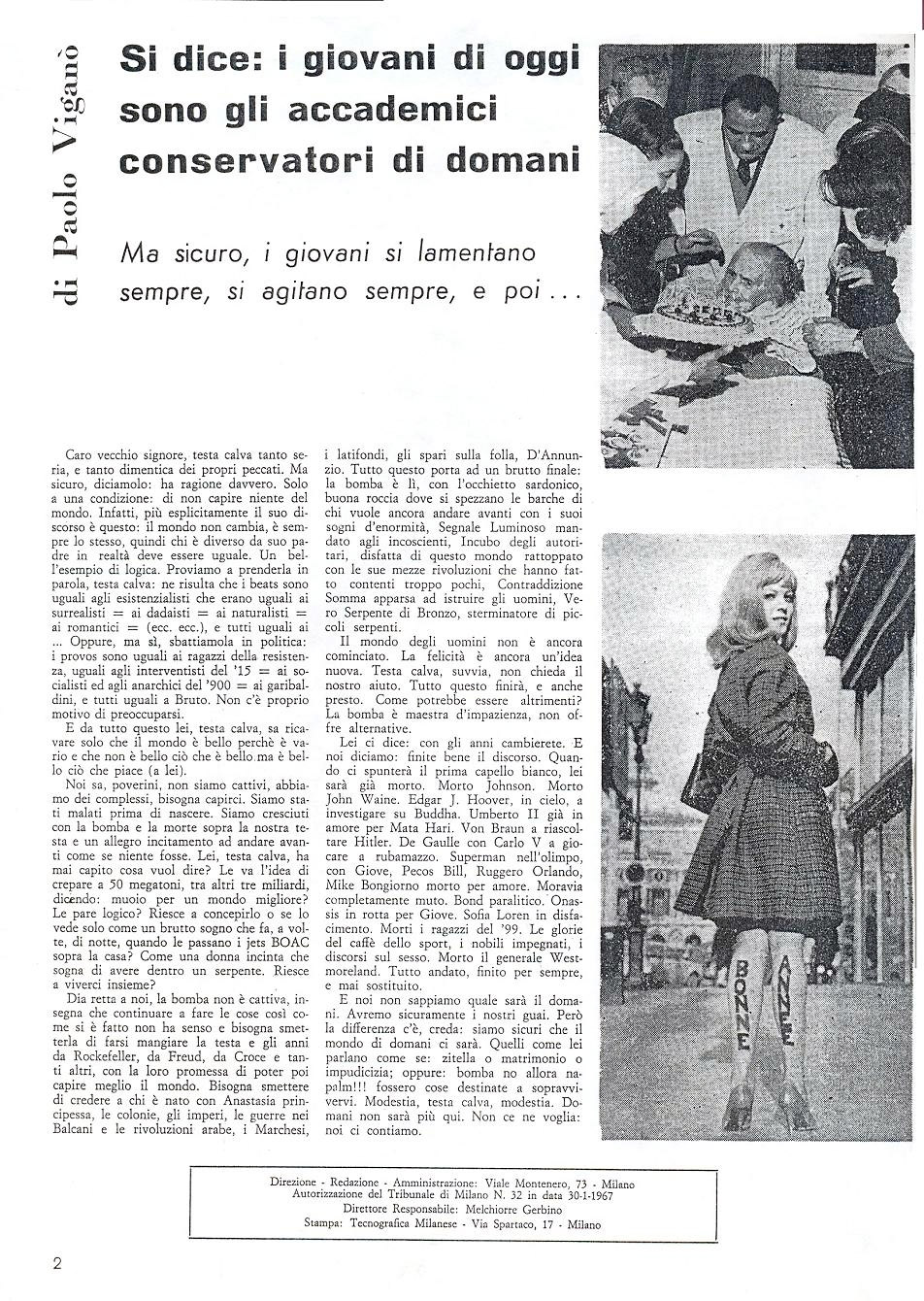
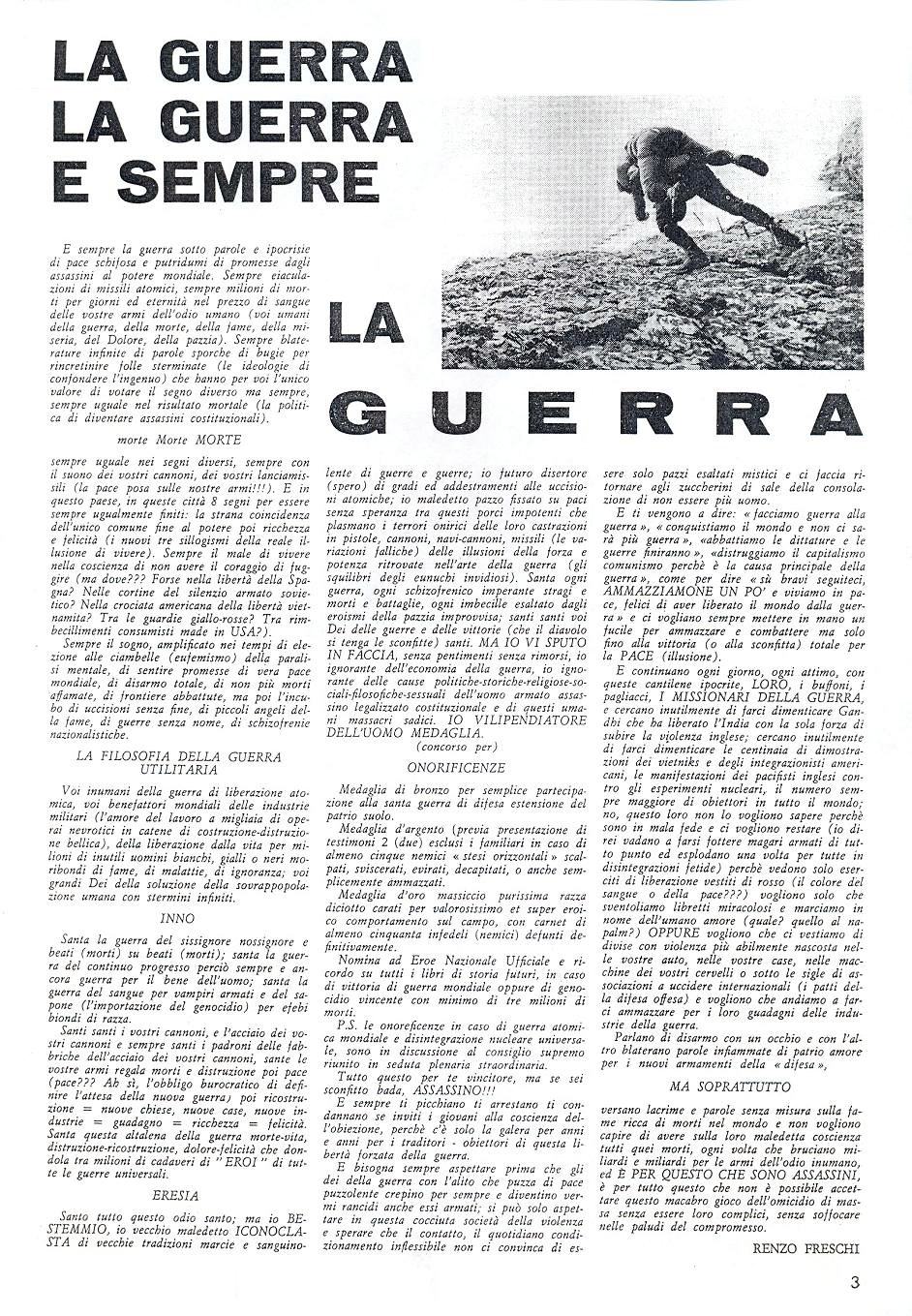
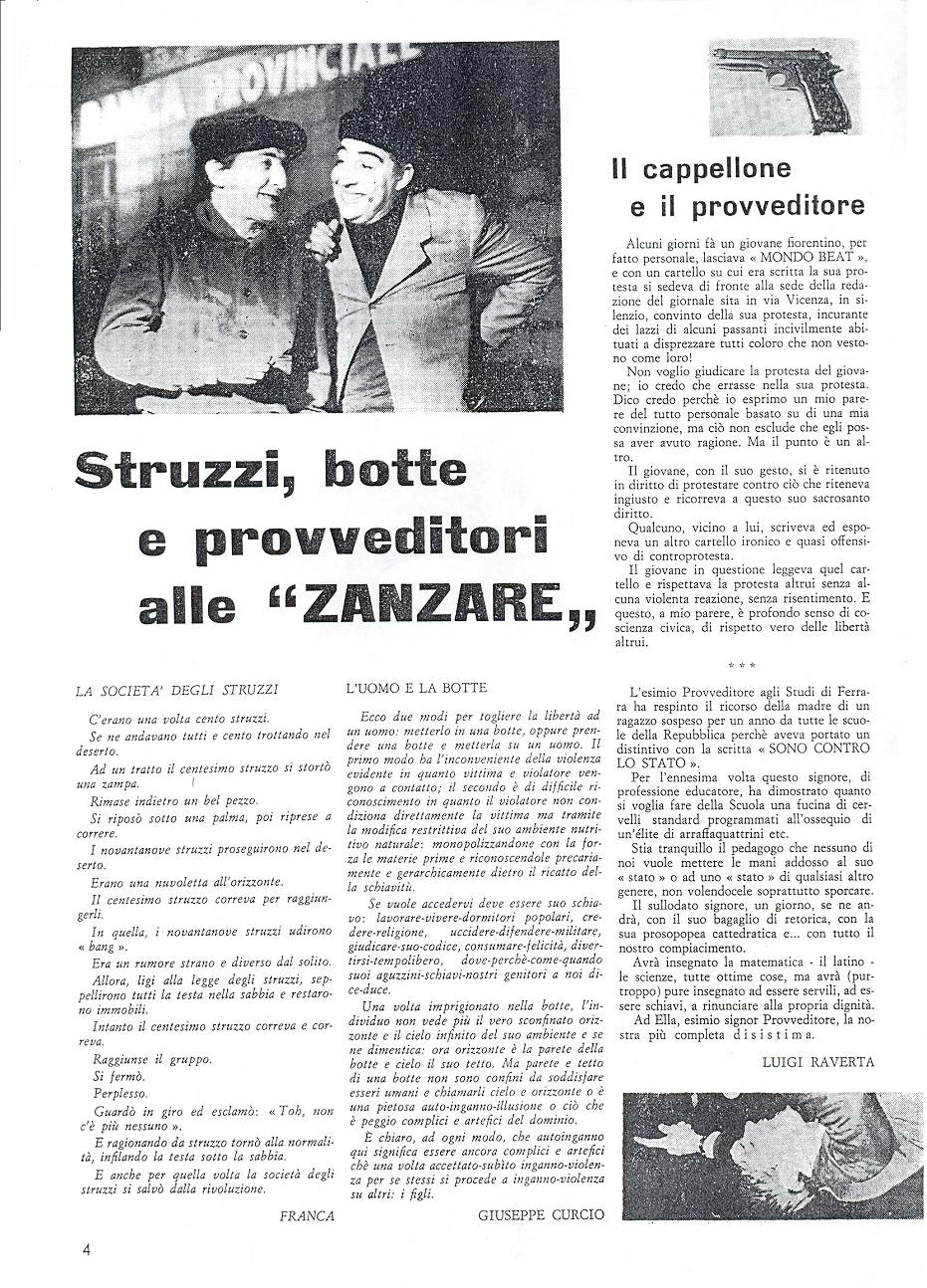
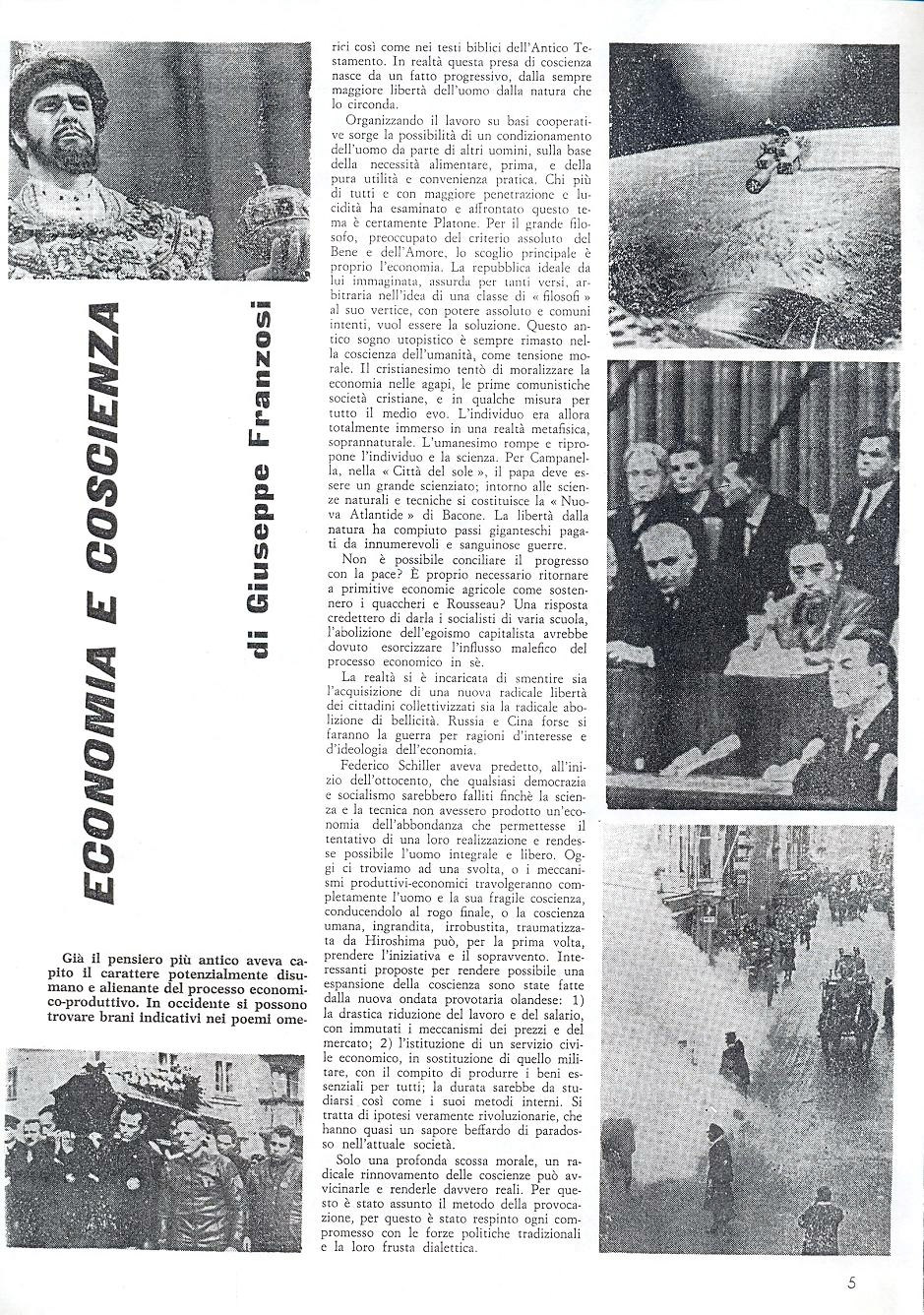

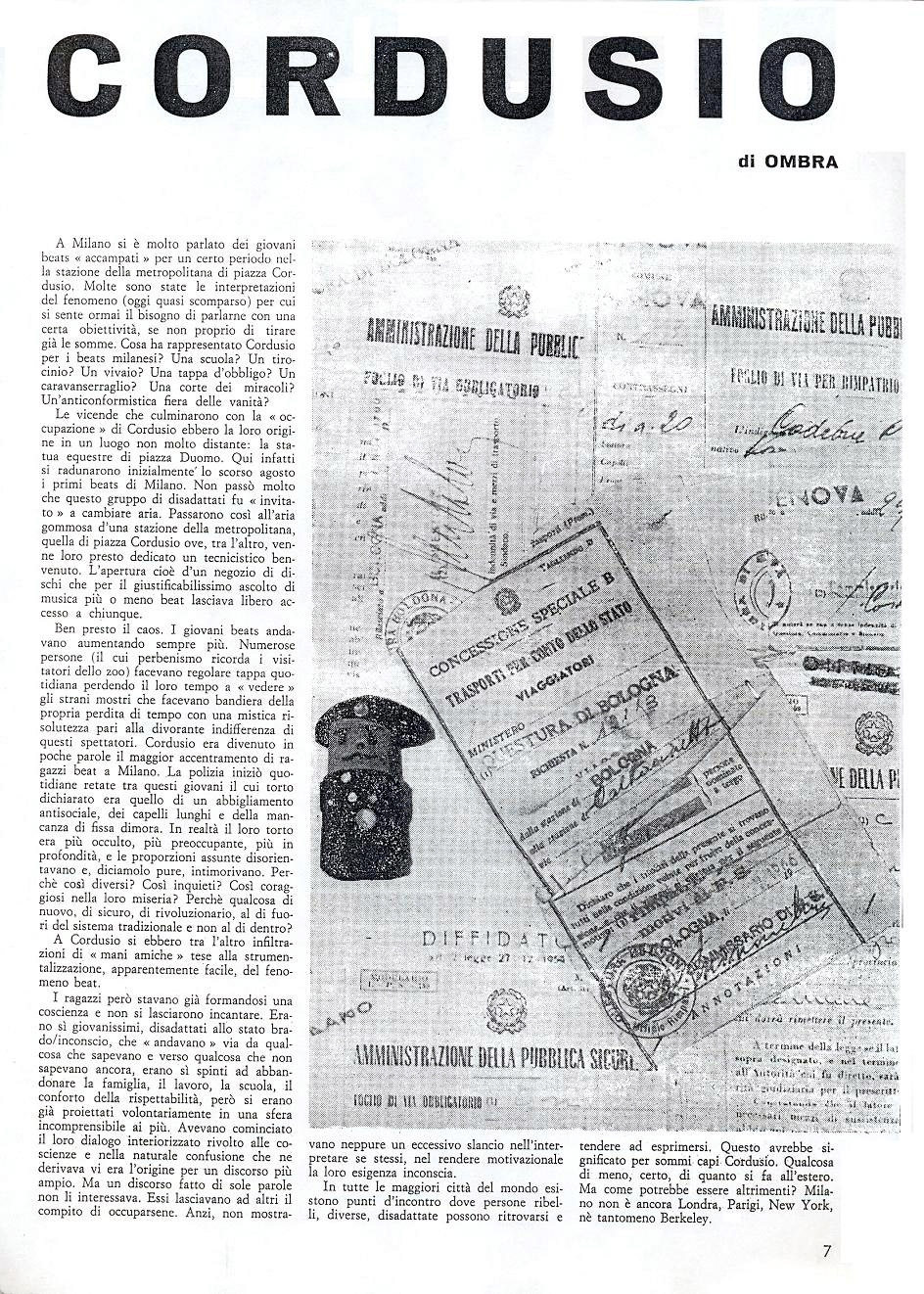
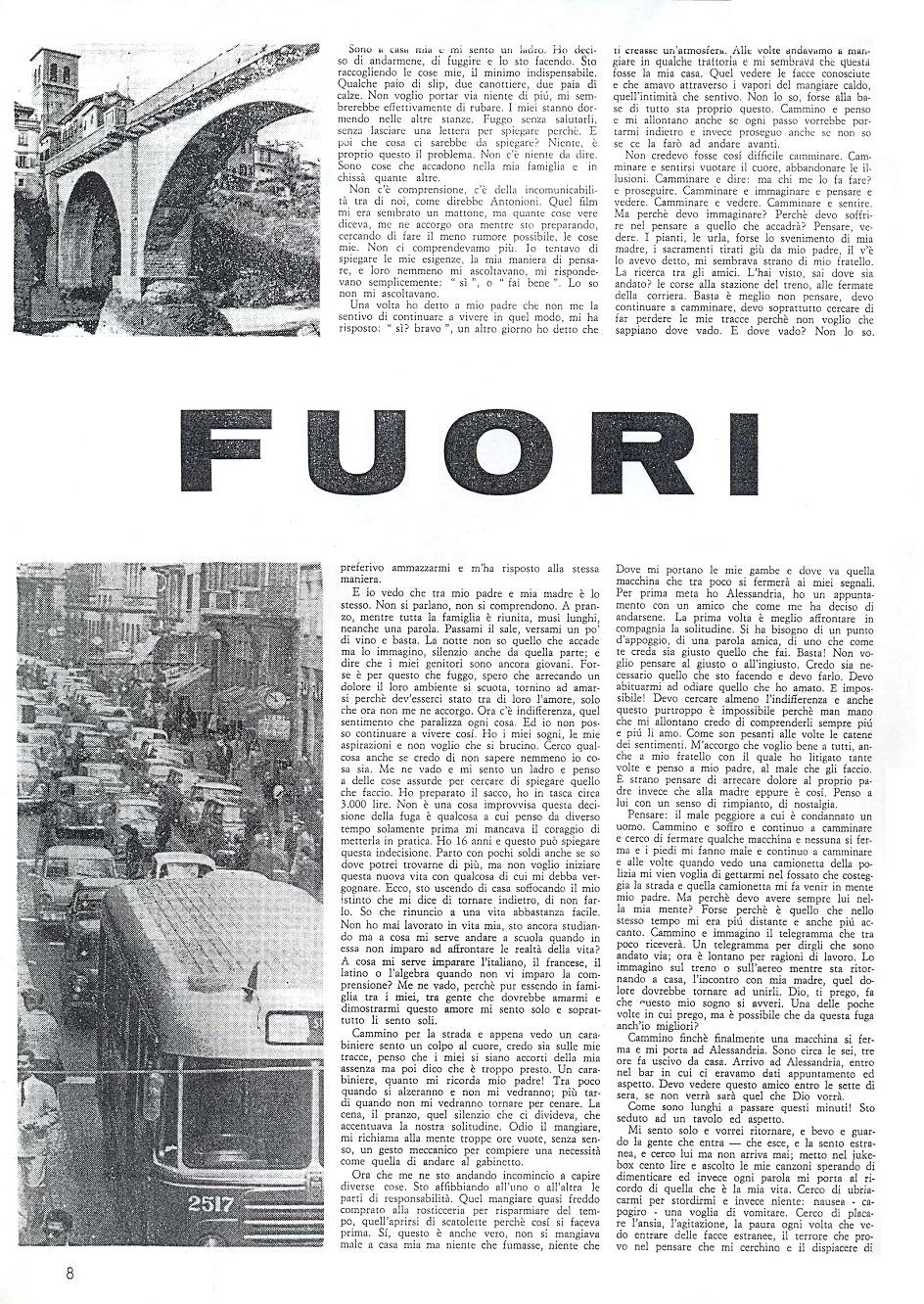
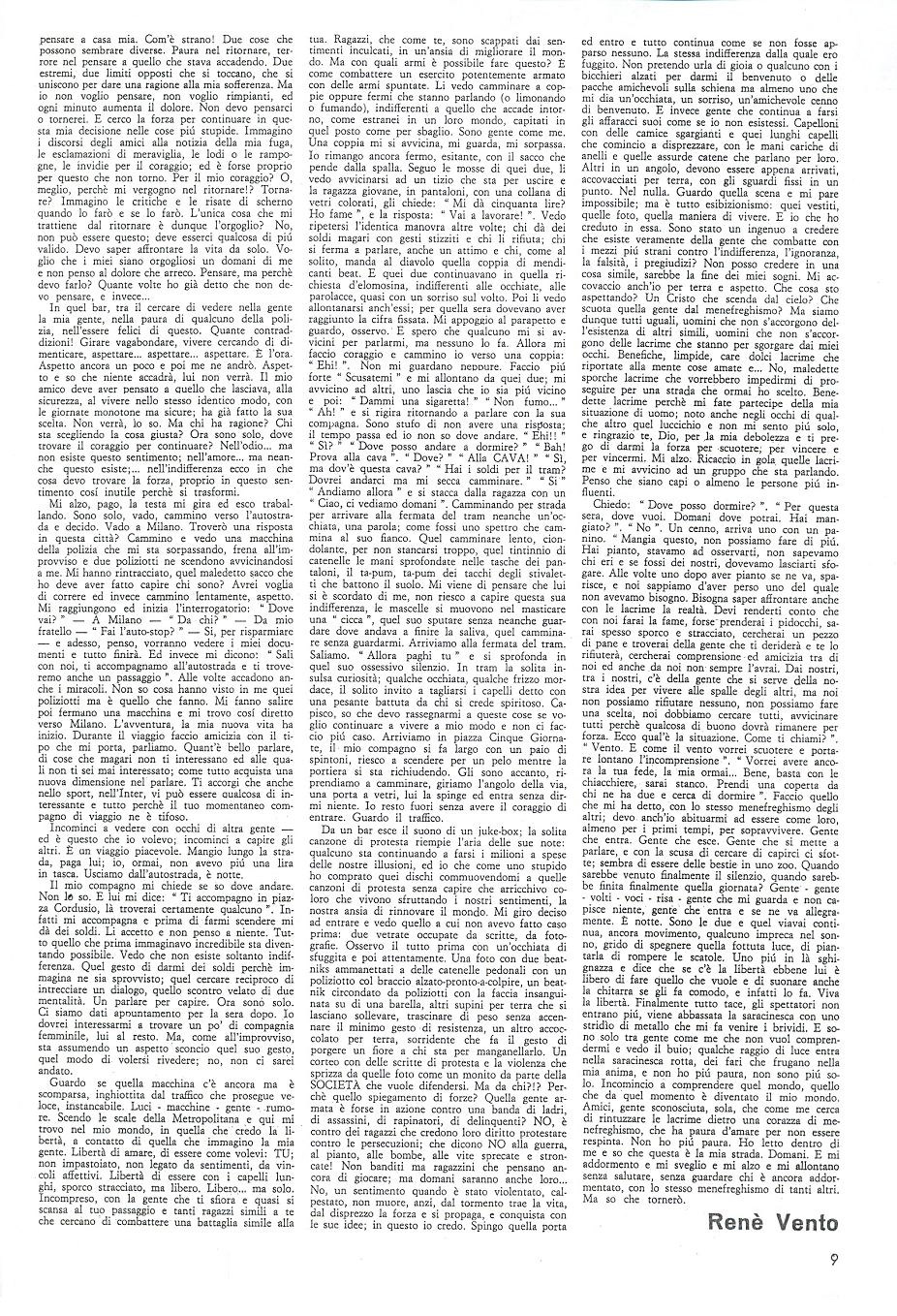
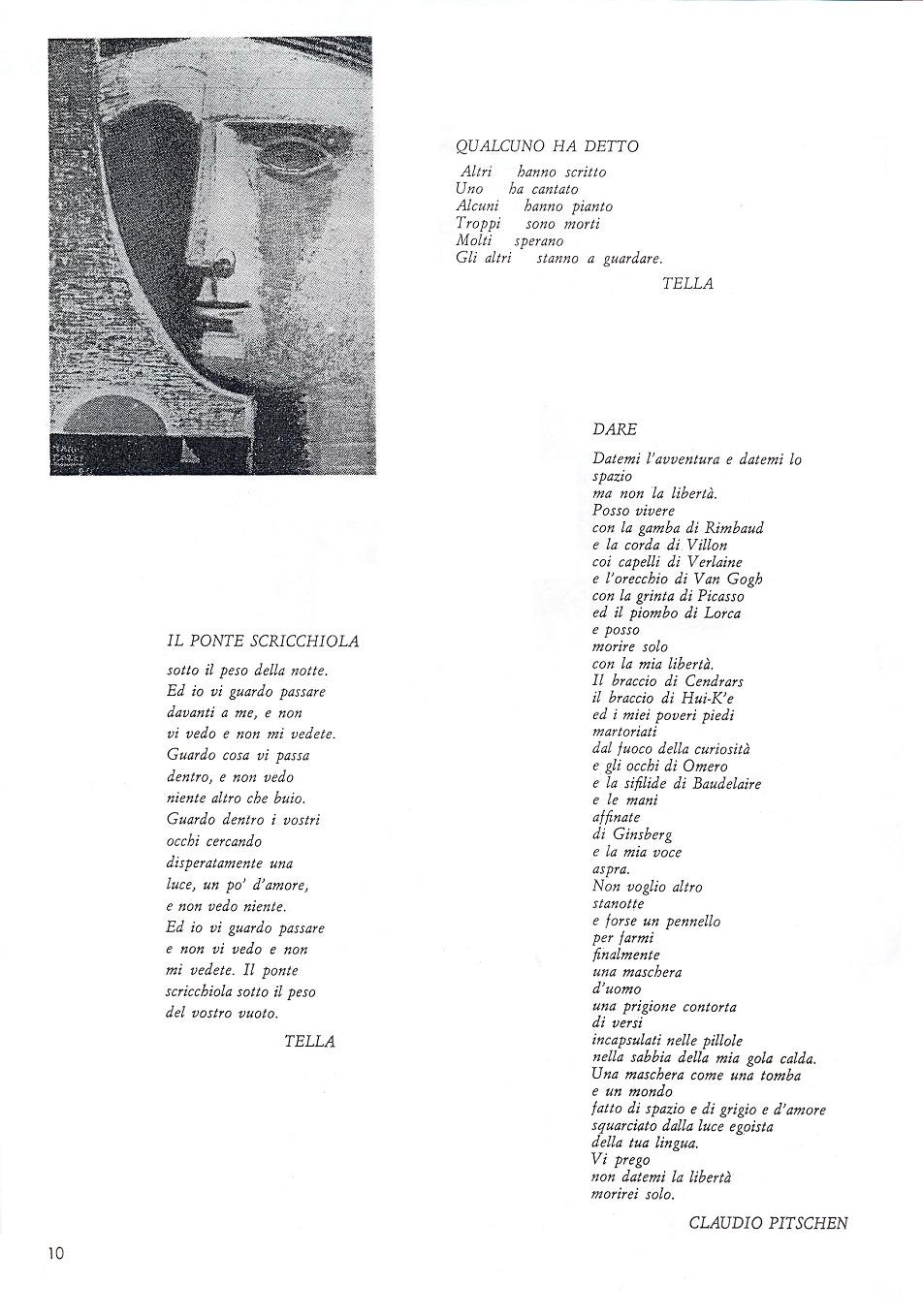
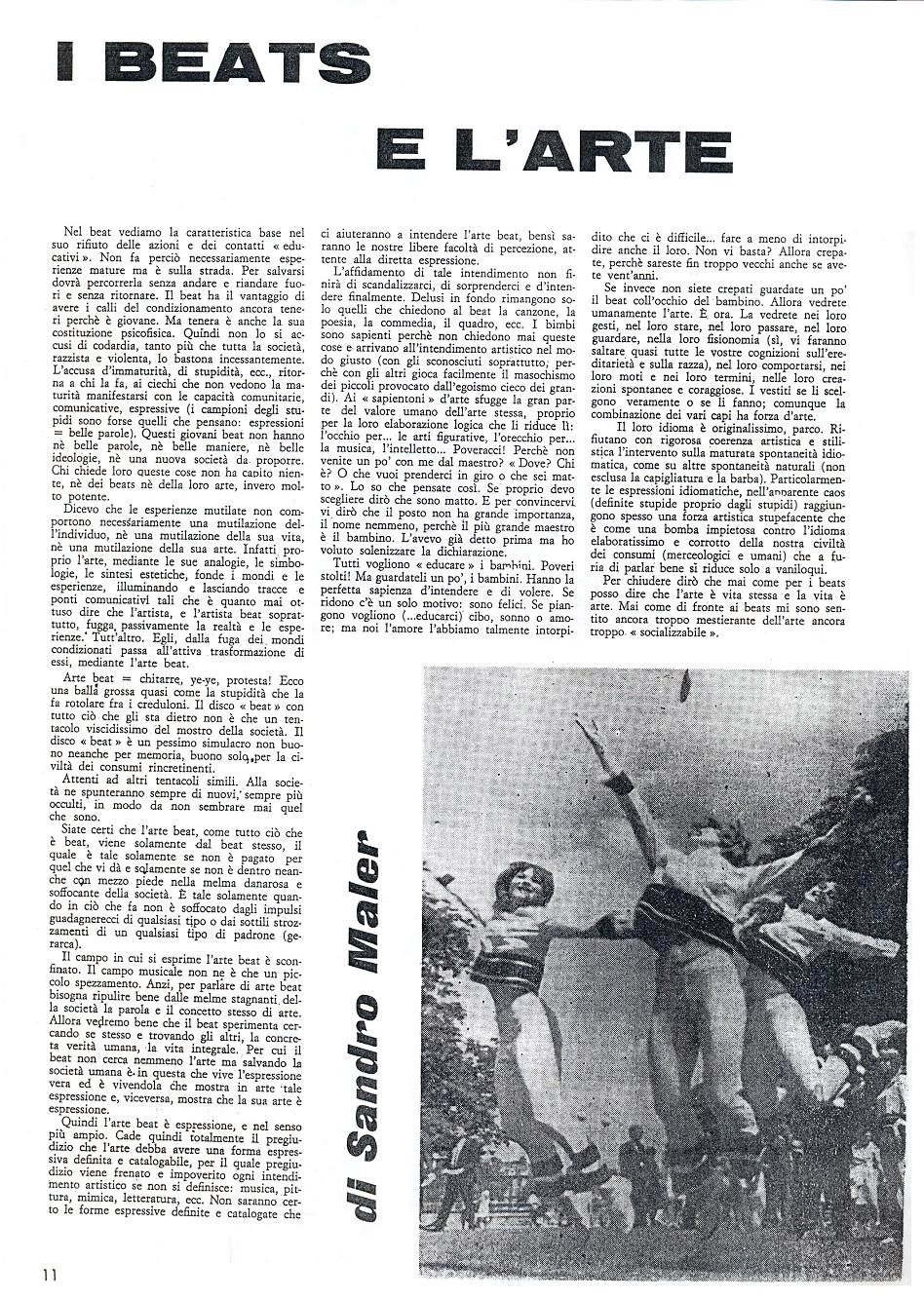
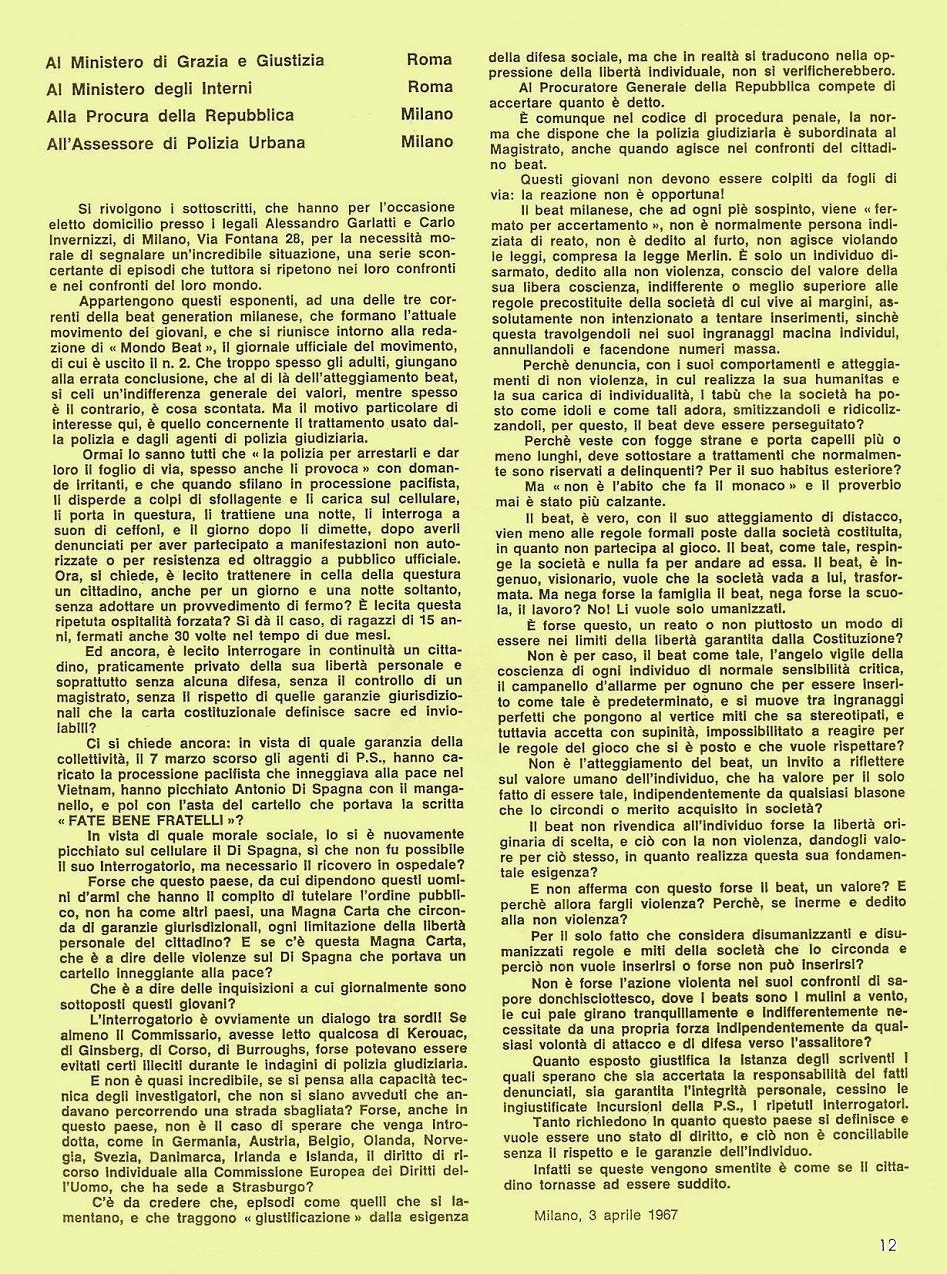
Comments on articles.
Note

As specified in the previous issue of the magazine, Melchiorre Gerbino, not having the authority to expel those unbearable characters defined as "external contributors to Mondo Beat magazine", published some of their writings on strict condition that they didn't frequent the Cave. He published these writings without having read them entirely, because they were nonsense, nor has he had the patience to read them so far, so he will not comment on these writings.
page 1 -
Such an attack was like a bolt from the blue for the journalists in the Corriere della Sera, which were revered as the most authoritative journalists of the Italian press. Because of this attack they got furious and we will see what their reactions.
page 2 -
" Si dice: i giovani di oggi sono gli accademici conservatori di domani" (It is said that today's young people will be tomorrow's conservative academics) by Paolo Viganò.
A stupid controversy by a certain Paolo Viganò, who did not understand what was happening with the Contestation and ridiculed an imaginary old man instead of attracting him among the young.
page 3 -
"LA GUERRA LA GUERRA E SEMPRE LA GUERRA" (War war and always the war). Blah blah of Renzo Freschi, who couldn't help himself from the anxiety of being published and wrote stereotypes.
page 4 -
Writings of three external contributors to Mondo Beat magazine
 -
-  -
- 
One more  external contributor to Mondo Beat magazine
external contributor to Mondo Beat magazine
This character was called Giuseppe Franzosi. Arriving for the first time at Mondo Beat, he positioned himself near the entrance to the Cave, sometimes on one side, sometimes on the other, but not too close to obstruct traffic, and for a week he talked about everything, with others or alone. The second week he continued like this on the ground floor of the Cave. The third week, to prevent him from going downstairs and entering the cellar, Melchiorre Gerbino welcomed him among the external contributors of the Mondo Beat magazine and so Giuseppe Franzosi was assured that some of his writings would be published, but on the strict condition that he didn't frequent the Cave.
To put it in a Christian way, Melchiorre Gerbino carried the cross of the external contributors to Mondo Beat magazine. If not for other reasons, he should be admired for the patience of a saint he proved.
page 6 -
And here, another  external contributor to Mondo Beat magazine (the one whose mother killed the wolfdog).
external contributor to Mondo Beat magazine (the one whose mother killed the wolfdog).
page 7 -
"Cordusio", by Ombra (Giorgio Cavalli). The description of the days when the Beats used to meet in the underpasses of Cordusio metro station. That was the time preceding the opening of the Cave.
As it has been mentioned, Giorgio Cavalli Ombra was one of the early Beats and one of the most famous in the Movement.
Many years after the Mondo Beat time, Melchiorre Gerbino met Giorgio Cavalli again in Milan. On that occasion, Ombra said something very gratifying for Gerbino, given the responsibility he had had in leading the Movement. They were talking with people who did not know much about the story of Mondo Beat, so, to make them understand, at one point Gerbino said: "Mondo Beat wanted to be an anarchist movement". And Ombra said "There has never been anything more anarchist than Mondo Beat".
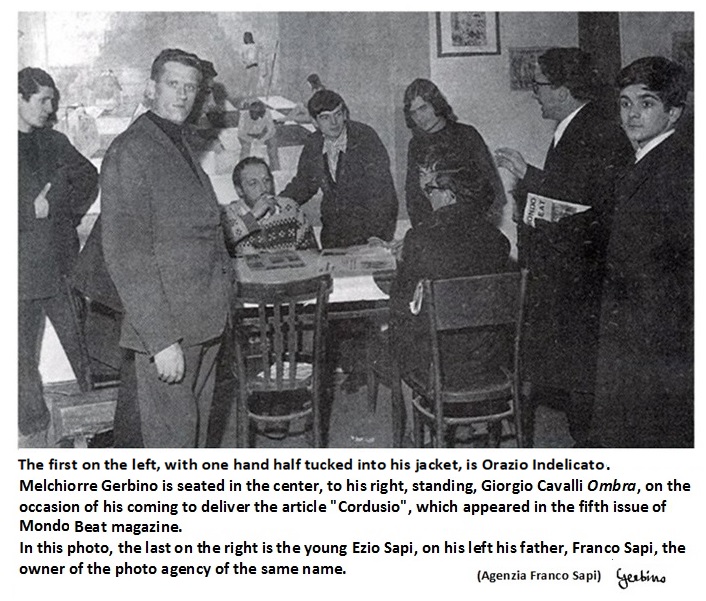
Ombra when he came to the Cave to deliver his article "Cordusio".
page 8 - and page 9
"FUORI" (OUT), by René Vento.
René was one of the first Italian homosexual activists (I want to recall that the term "gay" was not yet in use at the time of Mondo Beat). He was in his thirties and lived together with a boy who had ran away from home, whose surname was Vento, a surname which René adopted for himself. In this article, René Vento described the feelings of a boy who ran away from home and arrived for the first time at the Cave.
page 10 -
Poems, two of which by Tella (Tella Ferrari).
page 11 -
Sandro Mayer on Beats and art.
page 12 -
Copy of the complaint filed by Mondo Beat against the Milan Police Headquarters, prepared by the lawyers Alessandro Garlatti and Carlo Invernizzi.
At this point, let's say a few words about the real relationship between the police and the Beats.
All young people in the Movement were aware that the confrontation was not between them and the police officers, but between them and the establishment. This understanding was necessary especially for the youths from the Base of Mondo Beat, who had to be not only brave but also intelligent to carry out exemplary actions, which were intended to inspire all Italian youth. This understanding would have avoided a state of permanent confrontation between the Beats and the policemen. The confrontation between Beats and policemen couldn't be avoided during Mondo Beat demonstrations which were not authorized by the Police Headquarters, but in these circumstances the policemen were of special corps and with them the Beats wouldn't have had any more contact after the demonstrations; otherwise the Beats would have had daily, peaceful contact with ordinary policemen. Sure, there could be violent behavior on the part of some ordinary cop towards some Beat, but very seldom and almost always because some young cops couldn't hold back their jealousy, as the Beats had a lot of love affairs and they had not.

















 -
-  -
- 
 external contributor to Mondo Beat magazine
external contributor to Mondo Beat magazine
 external contributor to Mondo Beat magazine (the one whose mother killed the wolfdog).
external contributor to Mondo Beat magazine (the one whose mother killed the wolfdog).
